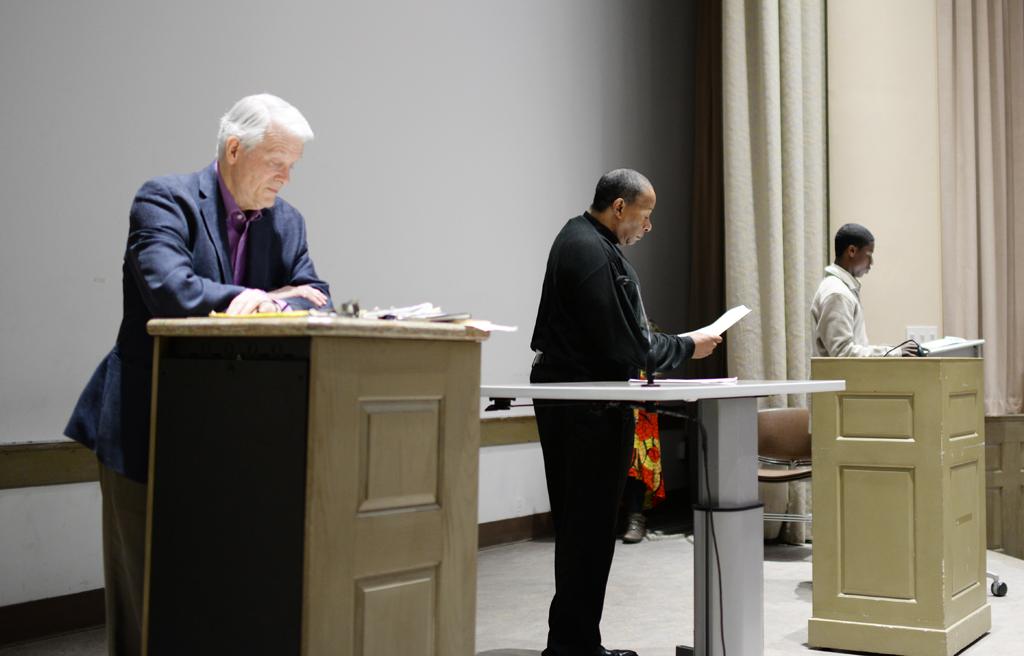

Wenhao Wu | Senior Staff Photographer
The title of August Wilson’s “Fences” might sound like a dividing play, but Wednesday afternoon it united an auditorium full of people.
Visiting anthropology professor Philip Kao’s Intro to Cultural Anthropology class hosted a two-day “Fences” excerpt reading, which drew about 70 students and non-students, as part of a larger, monthlong event commemorating Wilson’s most famous work.
August Wilson, the influential black Pittsburgh playwright, penned 10 plays — most of which take place in Pittsburgh, and predominantly comment on the black American experience.
The reading unfolded during the class’ Monday-Wednesday time slot, at 11 a.m. in the Frick Fine Arts Building in Room 125. Kao started the Wilson-themed event series to form a “community book project,” geared toward undergraduates.
“A lot of colleges have, when you go to orientation, [an event where] everyone reads a book and it’s a conversation — it’s a community,” he said.
The series began in February with history associate professor Laurence Glasco leading a biographical talk about Wilson’s life on Feb. 29, and will end Thursday, March 31, with a literary tour of the Hill District, Wilson’s home and frequent source of inspiration.
English studies professor Christopher Rawson, who is also an August Wilson scholar and has recorded more on the playwright’s life than any other scholar, moderated the readings. Local semi-professional actors read selected excerpts from the text, serving as a kind of highlight reel of the play.
“Fences” follows Troy Maxson, a former baseball player turned garbage man when he is unable to make good money swinging bats. As a result, Troy has trouble providing for his family as well as struggling with his role in life. His problems come down hard on his wife Rose and son Cory.
Local actors Kevin Brown (Troy Maxson), Vanessa German (Rose Maxson) and Wali Jamal (Bono, Troy’s best friend) lent their voices during Monday’s reading. Both Brown and German reprised their roles Wednesday, with actor Sundiata Rice joining them as Troy’s son from a previous marriage, Cory Maxson.
Caroline Stilley, an undeclared first-year, doesn’t usually enjoy plays, but she took something meaningful from the reading.
“I’m not really into plays,” she said. “But … it’s cool how the family gets together at the end of [it]. I think it definitely displays the struggles that African Americans faced in the ’50s. It’s really emotional.”
Rice won last year’s August Wilson Monologue Competition — a national contest in which high schoolers recite a monologue from any of Wilson’s plays.
The Pittsburgh Creative and Performing Arts School sophomore said he’s drawn to “Fences” because he resonates with the characters.
“The first time I did August Wilson was last year in the Pittsburgh August Wilson [Monologue] Competition,” he said during a Q&A session after the reading. “But then, that was when I opened my eyes to August Wilson and how he was just so honest with black culture, and really just being honest about things like father-son relationships.”
Wilson wrote the play in 1983 — 18 years before his death at 60 years old — of sudden fatal liver cancer. Critics generally consider “Fences” Wilson’s best work, but others might disagree.
“August Wilson always put “Fences” around sixth or seventh of his favorite plays,” Rawson, the moderator, said. “For me it comes around fifth or sixth.”
For Brown, the play’s everyday, blue-collar protagonist and familial themes make it timelessly relatable.
“I think because it has a human thing to it, it deals with family, father, mother,” he said. “Regardless of your ethnicity, where you come from, your station in life, everybody relates to family. He’s a garbage man. He’s a common man and I think most people can relate to that storyline.”
“Fences” has seen a handful of formal productions, from Pittsburgh to New York. Most recently, Denzel Washington sealed a deal with HBO to produce and adapt every play in Wilson’s Pittsburgh Cycle — a series of 10 plays that each span a different decade in the 20th century.
Washington will act alongside Viola Davis in an upcoming film adaptation of “Fences,” which will shoot in Pittsburgh, reprising their roles from the play’s 2010 Broadway revival.
“I don’t like to say that he is a great African-American playwright, although he is,” Rawson explained. “He’s a great American playwright, I don’t even like to say that, he’s a great world playwright.”
Rawson said the bulk of Wilson’s plays concerned groups of characters, with storylines eventually shining through and connecting to each other.
“Fences” was a contrast, with a strong central character that focuses the play. “Theater critics tended to like that. They called it ‘the Black “Death of A Salesman,”’” he said.
For Rawson, “Fences,” along with Wilson’s other works, displays the playwright’s understanding of not only black culture, but society in general.
“He said that all of his plays were about the same thing: love, duty, honor and betrayal,” he said. “And those are themes that run through all our lives.”
Recent Posts
Therese Pitman: Giving back to Pitt’s student-athletes with equality
Pitman is Pitt’s Director of Student Athlete Development where she helps student-athletes navigate their career…
Pitt speech and debate team heads to nationals
The William Pitt Debating Union, Pitt’s speech and debate team, sends students to both in-person…
Visuals: A Year in Review
The visuals desk had an interesting year. In the midst of the 2024 Presidential Election,…
De-stress events across campus offer students a break from studying
During finals week, departments across campus are offering wellness events to help students manage stress…
Pitt students share their summer plans
After a long and strenuous academic year, many students are excited to take a break.…
Column | Collaboration and connection make us better — yes, even in journalism
Today is the last day I will ever do this, and despite the amount of…

